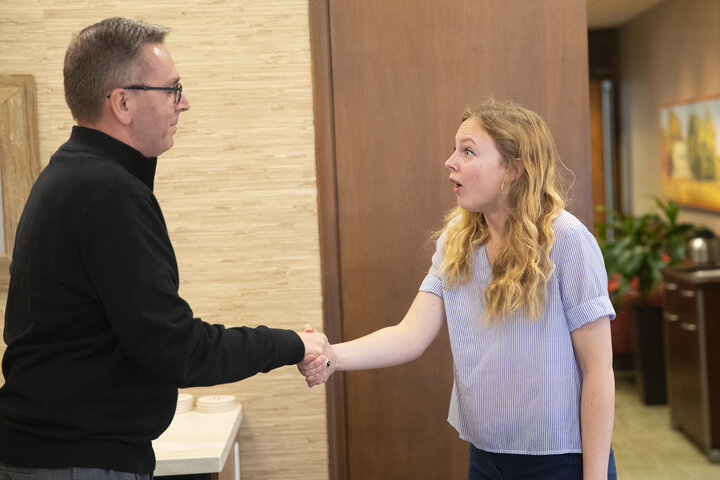Many undergraduates are driven by a desire to make a difference in their communities and address important issues facing society. Fellowships provide a structured way to pursue these passions, combining funding, professional development, and mentorship for individuals who enjoy public or community service work.
Commitment to Public Service
These fellowship communities are a good fit for students pursuing ambitious career paths in areas like community development, foreign affairs or diplomacy, and humanitarian relief. Students pursuing these fellowships typically have 1 or more years of consistent and personally meaningful public service work, such as internships or leadership roles in service projects, clubs, or organizations.
In exchange for their investment in the fellow, these fellowships usually require a commitment to a government or nonprofit employer for a set period (1+ years).
Vision and Ambition
A competitive candidate is confident in describing one or more specific issues facing society that they are passionate about, their proposed solutions, and how their educational goal and intended career path can build strengths toward advancing those goals.
Concrete Contributions
These fellowships emphasize the measurable positive impact of the fellow's work on the community or issue they are addressing. A standout candidate is able to use data and real-world examples to illustrate how your project or service contributions will benefit the community.

Additional Benefits
Fellowships often provide financial support, such as scholarships, making it feasible for students to engage in public service work that they might not otherwise be able to afford.
In addition, leadership development programming offers training and mentorship skills relevant to public service, such as project management, research, communication, and teamwork. If in-person attendance is necessary at some events or retreats, the fellowship typically includes travel support.
Finally, fellows also typically become part of a larger community of like-minded individuals. This network can provide support, collaboration opportunities, and lasting professional relationships.
Eligibility Notes
Many public service awards are designed to increase the number of American students pursuing government careers in areas of critical need for the United States; thus, many of these awards only allow applications from U.S. citizens or permanent residents.
Class year is determined by intended graduation date, not coursework units completed. Individuals whose plans do not exactly fit a four-year degree plan can refer to these guidelines.
- A first year (or freshman) will graduate between December and August, three or more academic years from now.
- A sophomore will graduate between December and August, two academic years from now.
- A junior will graduate between December and August, one academic year from now.
- A graduating senior will receive a bachelor’s B.A. or B.A. degree between December and August in the current/upcoming academic year, and/or will proceed to master’s coursework if participating in a 4+1 degree plan.
- An alumnus/a has already received a bachelor’s (B.S. or B.A.) degree and is not currently enrolled in any academic degree program.
Public Service Fellowships
Obama-Chesky Voyager Scholarship for Public Service
Supports U.S., permanent resident, or DACA sophomore undergraduates who have demonstrated a deep commitment to public service; includes study abroad, travel, and professional development resources.
External Deadline: Early April
Advising (by appointment): Mid-January to Late March
Funding Source: Private Foundation (Obama Foundation)
Tillman Scholars Program
Provides U.S. veteran and active duty military service members, who have extraordinary leadership potential, with undergraduate or graduate school support.
External Deadline: Late February.
Advising (by appointment): Early November to Mid-February.
Funding Source: Private Foundation (Pat Tillman Foundation)
Truman Scholarship for Public Service
Provides U.S. junior undergraduates, who have demonstrated exceptional leadership potential and commitment to public service, with professional development resources and graduate school funding to advance public service careers.
External Deadline: Early February.
Events, Advising, and Campus Nomination: Mid-October to Late January.
Funding Source: Independent Federal Agency (Truman Foundation)
Udall Undergraduate Scholarship
Supports U.S. sophomores and juniors who demonstrate leadership, service, and commitment to environmental conservation, tribal public policy, or Native health care.
External Deadline: Early March.
Advising and Campus Nomination: Early January to Early March.
Funding Source: Independent Federal Agency (Udall Foundation)
Additional Undergraduate Fellowships
Additional awards to pursue study abroad and build positive cross-cultural relationships are detailed under International Fellowships, while those to pursue research toward public service priorities are detailed under Research Fellowships.
Foreign Service Graduate Fellowships
The following fellowships support U.S. graduating seniors and recent alumni who intend to enroll in graduate school programs and pursue long-term careers in the U.S. Foreign Service.
External Deadlines: Mid-September to Late January.
Advising (by appointment): ~6-12 weeks prior to your fellowship’s external deadline.
Funding Source: Federal (Department of State, other agencies)
- Rangel International Affairs Program
- Pickering Foreign Affairs Graduate Fellowship Program
- Clarke Diplomatic Security Fellowship
- Foreign Affairs Information Technology Fellowship
- FAS International Agricultural Fellowship
Additional Graduate Fellowships
Additional awards to pursue graduate research in the public service are detailed under Research Fellowships, while those supporting graduate education abroad in the United Kingdom, Canada, China, and more are detailed in our guide to Graduate Fellowships.
Internship and “Gap Year” Public Service Programs
A wide variety of professional development experiences and public service internships designed for undergraduates and alumni are supported by Career Services. Book an appointment with a Career Coach in your College to discuss service-focused career enrichment opportunities such as the Nebraska Unicameral Legislative Page program, federal Pathways Internship Programs, the Coro Fellowship in Public Affairs, AmeriCorps service programs, Teach for America, and more.
If interested in global service in the Peace Corps, please connect with the Peace Corps Prep program representatives!